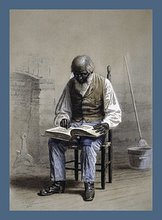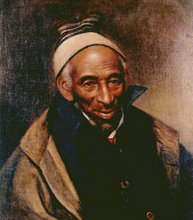C. Vann Woodward's book, The Strange Career of Jim Crow, offers further evidence that the North's problem with racism, generally not focused on as a problem, goes hand in hand with the problem of slavery in the south.
Woodward writes: "One of the strangest things about the career of Jim Crow was that the system was born in the North and reached an advanced age before moving South in force. Without forgetting evils peculiar to the South, one might consider Northern conditions with profit.
"By 1830 slavery was virtually abolished by one means or another throughout the North, with only about 3,500 Negroes remaining in bondage in the nominally free states." Although the Northern free Negro was not a slave, "his freedom was circumscribed in many ways." [17-18]
... "The Northern Negro was made painfully and constantly aware that he lived in a society dedicated to the doctrine of white supremacy and Negro inferiority. The major political parties, whatever their position on slavery, vied with each other in their devotion to this doctrine, and few politicians of importance questioned them. Their constituencies firmly believed that the Negroes were incapable of being assimilated politically, socially, or physically into white society [see notes from article below on this issue]. They made sure in numerous ways that the Negro understood his 'place' and that he was severely confined to it. One of these ways was segregation, and with the backing of legal and extra-legal codes, the system permeated all aspects of Negro life in the free states by 1860.
"Leon F. Litwack, in his authoritative account, North of Slavery, describes the system in full development. 'In virtually every phase of existence,' he writes, 'Negroes found themsleves systematically separated from whites. They were either excluded from railway cars, omnibuses, stagecoaches, and steamboats or assigned to special 'Jim Crow' sections: they sat, when permitted, in secluded and remote corners of theaters and lecture halls; they could not enter most hotels, restaurants, and resorts, except as servants; they prayed in 'Negro pews' in the white churches, and if partaking of the sacrament of the Lord's Supper, they waited until the whites had been served bread and wine. Moreover, they were often educated in segregated schools, punished in segregated prisons, nursed in segregated hospitals, and buried in segregated cemeteries.'
"In very few instances were Negroes and other opponents of segregation able to make any progress against the system. Railroads in Massachusetts and schools in Boston eliminated Jim Crow before the Civil War. But there and elsewhere Negroes were often segregated in public accommodations and severely segregated in housing. Whites of South Boston boasted in 1847 that 'not a single colored family' lived among them. Boston had her 'Nigger Hill' and her "New Guinea," Cincinnati her 'Little Africa,' and New York and Philadelphia their comparable ghettoes--for which Richmond, Charleston, New Orleans, and St. Louis had no counterparts. A Negro leader in Boston observed in 1860 that 'it is five times as hard to get a house in a good location in Boston as in Philadelphia, and it is ten times as difficult for a colored mechanic to get work here as in Charleston."
"Generally speaking, the farther west the Negro went in the free states the harsher he found the proscription and segregation. Indiana, Illinois, and Oregon incoprated in their constitutions provisions restricting the admission of Negroes to their borders, and most states carved from the Northwest Territory either barred Negroes in some degree or required that they post bond guaranteeing good behavior. Alexis de Tocqueville was amazed at the depth of racial bias he encountered in the North. 'The prejudice of race,' he wrote, 'appears to be stronger in the states that have abolished slavery than in those where it still exists; and nowhere is it so intolerant as in those states where servitude has never been known."
... "The advance of universal white manhood suffrage in the Jacksonian period had been accompanied by Negro disenfranchisement.... The Negro's rights were curtailed in the courts as well as at the polls. By custom or by law Negroes were excluded from jury service throughout the North. Only in Massachusetts, and there not until 1855, were they admitted as jurors. Five Western states prohibited Negro testimony in cases where a white man was a party. The ban against Negro jurors, witnesses, and judges, as well as the economic degradation of the race, help to explain the disproportionate numbers of Negroes in Northern prisons and the heavy limitations on the protection of Negro life, liberty, and property."[emphasis added][18-20]
In contrast, "A Northern reporter remarked with puzzlement in 1880 upon the 'proximity and confusion, so to speak, of white and negro houses' in both the countryside and cities of South Carolina. This pattern of proximity and confusion continued for decades in the older parts of the South.' [32]
This trend continued through the war. "There was as yet no sign of a revival of Northern resistance to Southern race [Jim Crow] policy. If anything, thought Thomas P. Bailey, Northern opposition was still on the decline. In his Race Orthodoxy in the South, published in 1914, Bailey asked: 'Is not the South being encouraged to treat the negroes as aliens by the growing discrimination against the negro in the North, a discrimination that is social as well as economic? Does not the South perceive that all the fire has gone out of the Northern philanthropic fight for the rights of man? The North has surrendered!... Even now the solid Far West is joining with the South in racial matters; and the end is not yet in the growing solidarity of the white people in this country." [113]
In the immediate aftermath of World War I, "the war-bred hopes of the Negro for first-class citizenship were quickly smashed in a reaction of violence that was probably unprecedented. Some twenty-five race riots were touched off in American cities during the last six months of 1919, months that John Hope Franklin called 'the greatest period of interracial strife the nation had ever witnessed.' Mobs took over cities for days at a time, flogging, burning, shooting, and torturing at will. When the Negroes showed a new disposition to fight and defend themselves, violence increased. Some of these atrocities occurred in the South--at Longview, Texas, for example, or at Tulsa, Oklahoma, at Elaine, Arkansas, or Knoxville, Tennessee. But they were limited to no one section of the country. Many of them occurred in the North and the worst of all in Chicago. During the first year following the war more tha seventy Negroes were lynched, several of them veterans still in uniform."
An article by John Boskin in the Spring 1966 Journal of Negro Education offers corroborating evidence that the view of the Negro in America as unassimilable began in the United States, in the North, very early. Boskin tries to find evidence of whether slavery was a product of racism in the United States (Carl Degler) or racism was a product of slavery (Elkins) or a combination of both. The chronology of laws assigned slave status to the Negro were Massachusetts in 1641, Connecticut in 1650, Virginia in 1661, Maryland in 1663, New York and New Jersey in 1664, and South Carolina in 1682. He places this in the context in which the colonies had already given up on educating and assimilating the Indians by the mid-sixteenth century. Nowhere in the colonies, Boskin finds, unlike the Indian before, were there any statutes calling for education of the Negro. "From the scanty evidence that exists, however, it would appear that the Negro did not receive formal education in the 17th century in the colonies. Although a small proportion of Negroes was exposed to religious and secular training, mainly in a haphazard fashion, apparently few, if any at all, legislative provisions for their education were enacted. The terms Negro and slave are conspicuously missing from the education statutes of the century. This omission is highly significant inasmuch as these terms are to be found in tax, defense, sex, and religious ordinances of the same period, and ' slave' was frequently used in conjunction with the term 'servant.' Virginia did not provide for compulsory education and mulatto children until 1765, categorized with orphans, poor, and illegitimate children.
"Thus, until further evidence becomes available, it may well be assumed that the Negro was regarded as uneducable. Certainly, once the process of denial of the African was begun, the unaltered direction was toward total rejection. The psychology of the situation worked against him. The African could not remain within society without first becoming similar to the English, and he could not become acculturated until actual steps were taken to educate him. If this hypothesis is valid, it would support the historians who contend that the African was subject to prejudice and discrmination decades prior to the crushing legislation of the 1660s."
Sunday, September 10, 2006
Subscribe to:
Post Comments (Atom)



No comments:
Post a Comment